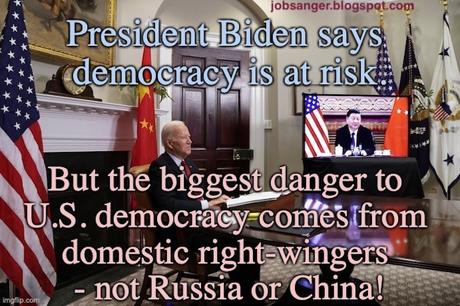
One of the worst things that could happen to global democracy is for democracy to fail in the United States. And that is currently in danger of happening -- not from China or Russia -- but from domestic right-wingers in the Republican Party.
Here's part of what Aaron David Miller and Richard Sokolsky wrote about the danger to democracy in The Washington Post:
If the Biden administration has a foreign policy doctrine, it’s surely the president’s oft-stated vision that democracies are locked in a must-win historic battle with autocracies. . . .
To give substance to that focus, the administration this coming week will convene the first of two planned Summits for Democracy. The virtual gathering of leaders from more than 100 countries is designed, according to a State Department announcement, to “set forth an affirmative agenda for democratic renewal and to tackle the greatest threats faced by democracies today through collective action.” Implicitly, it is a show against authoritarianism, especially in China.
There are many good reasons to host such a gathering. It’s smart politics, fulfills a campaign commitment and counters the perception, fostered by President Donald Trump, that America is no longer interested in promoting democracy and human rights. But as a geopolitical instrument, drawing lines between democracies and autocracies is not only certain to disappoint — it’s also a deeply flawed organizing principle for America’s approach to the world.
China and Russia, which Biden has also singled out for criticism, are not the main causes of the weakening of democracies around the world. Most of the backsliding, according to a recent study, has been caused by erosion within the world’s democracies, including the United States and many of its allies. Indeed, the upcoming summit includes a number of countries — India, Brazil, the Philippines and Poland among them — marked by growing autocratic movements and infringements on freedom of expression and a free press. And pushing these and other countries to reform their political, electoral or judicial institutions from the outside is hard if not impossible. . . .
There’s also the politically inconvenient question of whether the United States is best positioned to lead this effort. Rarely has America’s democracy crusade abroad contrasted more with its commitment to democratic practices at home — where the threats include Trump’s false claims that the presidential election was “stolen,” an insurrection to stop a democratic transition and efforts to restrict voting rights. America has a glass-house problem, and it needs to promote its democratic virtues with considerable humility. According to Freedom House’s annual country-by-country assessment of political and civil rights, the United States continued to experience erosion in democratic practices in 2020;over the past decade, America’s score dropped from 94 to 83 out of 100, among the steepest falls of any country during this period.
It is hard to take seriously the notion that the United States can restore its “soft power” by virtue of the example it is setting at home. A recent Pew Research Center study found that a median of only 17 percent of people in surveyed countries thought U.S. democracy worth emulating, while 23 percent said it had never offered a good example. It is also hard to quibble with the proposition that America’s influence abroad is waningprimarily because of its domestic problems, rather than authoritarian muscle-flexing in Moscow or Beijing.
Instead of chasing the chimerical goal of democratizing the domestic political orders of other countries according to a one-size-fits-all democratic shoe, the Biden administration would be well-advised to set its sights lower. . . .
The Biden administration is fond of talking about going big, but when it comes to promoting democracy, it would be far better if it went smaller abroad and, given the perilous state of American democratic practices, very big at home.

